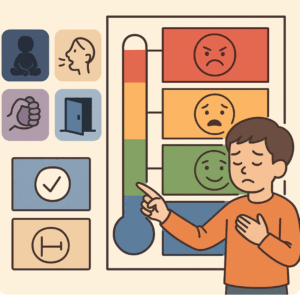🧠 Emotional Regulation in Children with Autism: Helping Them Understand and Manage Big Feelings
 Children on the autism spectrum often experience emotions intensely—but may struggle to identify, express, or regulate those feelings. This difficulty with emotional regulation can lead to meltdowns, shutdowns, or anxiety in everyday situations like school, social events, or even a simple change in routine.
Children on the autism spectrum often experience emotions intensely—but may struggle to identify, express, or regulate those feelings. This difficulty with emotional regulation can lead to meltdowns, shutdowns, or anxiety in everyday situations like school, social events, or even a simple change in routine.
Understanding emotional regulation is crucial not just for reducing outbursts, but for building self-awareness, confidence, and social functioning.
🔍 What is Emotional Regulation?
Emotional regulation is the ability to:
-
Notice and label your feelings
-
Understand what triggered them
-
Respond in a way that is helpful, not overwhelming
Children with autism often have:
-
Delayed emotional awareness (they know something feels “bad” but not what or why)
-
Difficulty communicating distress
-
Rigid thinking (they can’t adapt quickly when things go differently)
-
Low frustration tolerance
-
Sensory overload, which worsens emotional control
🛑 Meltdown vs. Tantrum: Know the Difference
| Feature | Tantrum | Meltdown |
|---|---|---|
| Goal | Wants something | Overwhelmed by emotion/sensation |
| Control | Partially under control | Involuntary |
| Stops if rewarded | Usually | No, must calm down naturally |
| Response | Behavior strategy | Emotional co-regulation |
Meltdowns aren’t misbehavior—they’re a stress response.
🧩 What Triggers Emotional Dysregulation?
-
Change in routine (unexpected guests, changes in schedule)
-
Sensory triggers (noise, clothing, lighting)
-
Social misunderstandings
-
Demand overload (multiple instructions at once)
-
Fatigue, hunger, illness
🧘 How to Help Children Regulate Emotions
1. 📘 Teach Emotion Words
Use visuals and stories to build a vocabulary of feelings:
-
Use emotion cards or emojis
-
Practice labeling: “You look frustrated—was that because of the noise?”
-
Read books about feelings (“The Color Monster,” “When Sophie Gets Angry…”)
2. 🪞 Model Calm Behavior
Your own calmness teaches co-regulation:
-
Use simple language: “I’m feeling upset, so I’ll take a deep breath.”
-
Speak slowly and softly during emotional episodes
3. 🧃 Use a Feelings Thermometer or Zones of Regulation
Visual tools help kids recognize what zone they’re in:
-
🔵 Blue: tired/sad
-
🟢 Green: calm/ready
-
🟡 Yellow: worried/frustrated
-
🔴 Red: angry/meltdown
Once they know the zone, they can choose calming tools.
4. 🎒 Create a Calm Down Kit
Prepare a small kit with:
-
Noise-cancelling headphones
-
Fidget toys
-
Weighted items
-
Chewy necklaces
-
Picture cards with strategies: “Ask for break,” “Breathe,” “Go to quiet room”
5. 🧘 Practice Regulation Skills Daily
-
Deep breathing (e.g., “Smell the flower, blow the candle”)
-
Muscle squeezing and relaxing
-
Swinging or gentle jumping
-
Drawing or water play
6. 🧠 Teach Coping Scripts
Help them rehearse what to say:
-
“Can I take a break?”
-
“I need help.”
-
“I feel angry, I need my squeeze ball.”
Repeat these outside the moment, like role-playing.
7. 📅 Plan for Transitions and Stressful Situations
-
Use visual schedules and timers
-
Warn ahead: “We will leave the park in 5 minutes.”
-
Use social stories for new experiences (doctor visit, haircut, birthday party)
🧑⚕️ When to Seek Professional Help
A child psychiatrist or psychologist can help if:
-
Meltdowns are frequent and unsafe
-
Child shows self-injurious behavior
-
There are signs of anxiety, depression, or sleep issues
-
Emotional outbursts interfere with school or home life
💬 What to Say to the Child
“Your feelings are real. You’re not bad or naughty. Let’s work together to make them easier to handle.”
💡 Final Thought
Teaching emotional regulation is a journey, not a quick fix. With patience, tools, and support, every child on the autism spectrum can learn to better understand and express their feelings—and find safety in their own mind and body.
Dr. Srinivas Rajkumar T, MBBS, MD (Psychiatry)
Consultant Psychiatrist
Apollo Clinics Velachery & Tambaram
Child & Adolescent Mental Health Specialist | Autism & Behavior Disorders
🌐 www.srinivasaiims.com
📞 8595155808 Online and in-clinic consultations available